Contents
Overview of Berkeley Town House (BTH)
Berkeley Town House (BTH) Cooperative Corporation is a residential cooperative located at 2550 Dana Street, Berkeley, CA. It is close in proximity to shopping areas, UC Berkeley campus, cultural events, restaurants and public transportation.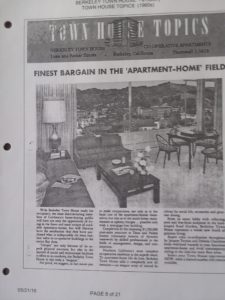
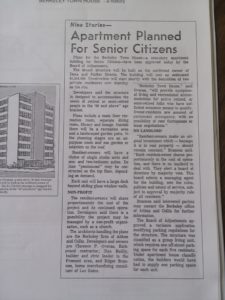
BTH was incorporated in 1960, and the building was completed in 1962.[1. http://www.eastbaysmartsenior.com/aging-in-community-berkeley-ca-2/] The building is comprised of 59 apartments which are owner-occupied as “tenant-shareholders” in a consumer cooperative corporation. Owners and residents must generally be over 55 years of age unless they fall into an exception, as spouse or caregiver. Group activities are often arranged by members in the common areas, which include movie screenings, a biweekly crafts group, musical performances, gardening, occasional potlucks. Amenities at BTH include a library, dining room, common kitchen, lounge, multimedia room, patio, garden, laundry room, underground garage, storage rooms.[2. http://berkhouse.info] BTH is an age restricted apartment house, and not an old age living facility, which means that residents do not receive any meals or services to provide for their health needs.
History and zoning – how BTH became a senior housing cooperative
In 1960, three developers formed a corporation called Berkeley Town House Cooperative Corporation, to buy and develop land. The developers may have originally envisioned the apartment complex as housing for professors, but the land they purchased was zoned as R-5,[3. Email correspondence with Larry Layne, dated 10/30/2017, on file with author] which meant that every apartment unit would need to have its own parking space. This would have necessitated the construction of a multilevel parking garage, which would have been extremely costly. The developers therefore applied to the City Board of Adjustment for a variance and use permit. The variance was approved on the contingence that the building be designated for ‘older persons’. Fifty-six apartment units were constructed, each with its own kitchenette, including a total of twenty-six parking spaces, for a little under half the residents.
BTH’s original Articles of Incorporation made no mention of ‘senior citizens’ and not all the apartments were initially reserved for people over 55 years of age. There were letters back and forth to the City of Berkeley, with the City alleging that BTH was in violation of the variance, but no action was ever taken by the City.[4. Id.]
In about 1989, State California Law, Civil Code Section 51.3 was enacted setting the senior age for senior housing at 62. This was later amended to 55. BTH voted to conform to Section 51.3 shortly thereafter.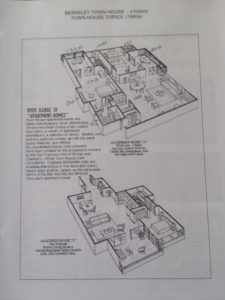
Sales of cooperative units
Sales of apartments are negotiated directly by the member and are usually listed with a real estate agent. Leases of apartments are extremely rare. At least one person residing in each dwelling unit needs to be a “senior citizen” or “qualifying resident” approved by the Board of Directors. Residents under the age of 55 are allowed to live at BTH if they are the member’s spouse or a caregiver. If a member leaves their apartment to an heir, if the heir is not 55 years of age or older and approved by the board, the heir must sell the apartment to a qualifying buyer. If an apartment is not bequeathed correctly, BTH will maintain the apartment while it is stuck in probate, cleaning it and making sure that any disrepair does not negatively affect other apartments in the cooperative.
Price of units
BTH is more affordable than many senior housing developments, because it does not provide central medical, nursing, nutritional, laundering, or housekeeping services. BTH once provided dinners to residents from their commercial kitchen, but no longer offers that option.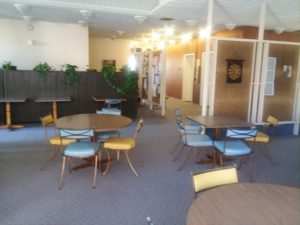
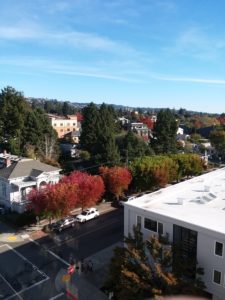
Each unit is approximately 700 square feet and goes for, on average, $400,000, with some deviation depending on what floor the unit is located, and any improvements due to renovations. Prices of units generally increase as the floors get higher, because of better views. (There are seven floors of apartment units at Berkeley Town House, with units on the 7th floor valued the highest.) A similarly sized unit located close by on Telegraph Avenue in Berkeley, near the UC Berkeley campus, is valued at approximately double the cost. Shares are sold on the open market, and there are no income restrictions for applicants.
BTH members pay regular assessments. Assessments include operating expenses of the property and services furnished, cost of necessary management and administration, taxes, fees levied against the property or corporation, insurance, gas, office phone, common area electricity, the usual maintenance and upkeep costs. heating of individual units, cost of repairs including of elevators, and general operating reserve. The Board of Directors also has the power to levy special assessments.
Monthly dues are based on a percentage ownership of the building. Those percentages date back to the early 1960s when the apartment development fees had to cover building costs. The original developers made that determination of the relative ownership of each unit in relation to the project, based on its size and value. The developers’ original determinations are still used today in calculating members’ percentage of dues, based on the original selling price. No two units of the same size have the same assessment dollars.[5. Email correspondence with Larry Layne, dated 11/18/2017, on file with author] Units with parking stalls are assessed an additional 0.136%. Dues range from $300 to over $1,000 a month. The Articles of Incorporation state the membership has an equal share: one person, one vote. At one time votes were based on shares, but that was changed years ago.[6. Id.]
Group meals
From the time that BTH was built in the early 1960s, until about 1981, prepared dinners were offered to residents. BTH had a functional commercial kitchen, and any member who wished to buy a dinner subscribed to those services. BTH contracted with an outside company to prepare these meal services in their communal kitchen. By the end of 1981, however, BTH decided that this was not a profitable endeavor, and ended this option.
The original apartments were only designed with small kitchenettes in lieu of standard kitchens. Many members didn’t feel they were able to prepare meals adequately. Over the years, some unit owners have renovated their kitchenettes with additional counter space, newer appliances, dishwashers and microwaves.
Restrictions on types of residents and activities within BTH
Restrictions on types of residents is based on Davis Stirling and applicable codes.[7. Davis-Stirling Common Interest Development Act. (California Civil Code §§ 4000 – 6150), available at http://leginfo.legislature.ca.gov/faces/codes_displaySection.xhtml?lawCode=CIV§ionNum=51.3] At least one person residing in each dwelling unit needs to be a “senior citizen” or “qualifying resident” approved by the Board of Directors. “Senior citizen” means a person 55 years of age or older in a senior citizen housing development. Any other person residing with the senior citizen in a dwelling unit should also be a senior citizen, or a “qualified permanent resident”, or a “permitted health care resident”.[8. California Civil Code Section 51.3]
“Qualified permanent resident” means a person who (1) was residing with the senior citizen prior to the death of or dissolution of marriage with the senior citizen or prior to a hospitalization or other prolonged absence of the senior citizen, and (2) was one of the following: (i) 45 years of age or older, or (ii) a spouse of the senior citizen or a cohabitant living with the senior citizen as husband or wife, or (iii) the person providing primary physical or economic support to the senior citizen.[9. BTHCC Bylaws, p. 6]
“Qualified permanent resident” also means a disabled person or person with a disabling illness who is a child or grandchild of the senior citizen who needs to live with the senior citizen because of the disabling condition, illness, or injury.[10. Id.]
“Permitted health care resident” means a person hired to provide live-in, long-term, or terminal health care to a senior citizen, or a family member of the senior citizen providing that care. The care provided must be substantial in nature and must provide either assistance with necessary daily activities or medical treatment, or both.[11. Id.]
There is no smoking allowed on the premises, and members are not allowed to have dogs as pets, (except service dogs).[12. http://berkhouse.info] As members age, many receive visits from caregivers and doctors. There are currently a few members who utilize wheelchairs. A live-in caregiver may live with the resident inside an individual resident’s unit, as long as they qualify as a “permitted health care resident”. There are part-time caregivers that come and go all day and night according to residents’ needs without the board’s approval.
BTH Governance Structure
The Davis-Stirling Act applies to all common interest developments in California. In addition, the Corporations Code applies to all incorporated associations.
Under Davis–Stirling, a developer of a common interest development may create a homeowner association (HOA) to govern the development. A requirement of creating the HOA, is to record a document known as the Declaration of Covenants, Conditions, and Restrictions (CC&R) with the county recorder. Since Berkeley Town House is a common interest development operating as a homeowner’s association, it is governed by the Davis-Stirling Act, and is governed by CC&Rs, as well as bylaws, articles of incorporation, and an occupancy agreement, which BTH enters into with every member, setting terms and conditions that the member must follow in order to avoid being terminated. These documents, regulations and agreements are subject to change periodically. The governing documents consisting of the Bylaws, Declaration, Articles of Incorporation and Occupancy Agreement may be amended by a majority vote of the Membership.
Board of Directors
BTH is governed by a five member elected board of directors. No compensation is paid to directors for their services, and all directors must be resident members. In addition to being a member in Good Standing, all Directors must also: (i) not have been found by a court of competent jurisdiction to be of unsound mind, and (ii) not have been convicted of a felony.
BTH also has several committees. There is a social committee, arts and furnishings committee, litigation committee and governing documents committee. These committees are open to resident members, and not just board members. There used to be an interview committee, but there isn’t one at present. The Board interviews prospective buyers and through discussion and deliberation make a decision to approve or not approve. There is typically one board meeting per month.
The powers and duties of the Board of Directors include establishing monthly Regular Assessments to be paid by the members, taxes and insurance, and all other expenses of the Corporation, based on an annual operating budget; to consent to the subletting or assignment of an Occupancy Agreement; to approve of alterations to dwelling units to be made by members; to terminate membership and occupancy rights for cause; and to establish committees. Directors also have the power to issue fines on members for violating the rules set out in their governing documents. Fines may be imposed for smoking, violating fire code requirements, and more.
Except for the bona fide emergency meetings and executive sessions, at least four days’ prior written notice of Board meetings must be given to members, including the agenda for each meeting. BTH meetings and process are consistent with Davis Stirling. There is a monthly open Board meeting, usually the fourth Wednesday of the month and the annual meeting in May. Other open meetings, special and emergency and closed executive meetings are called as necessary.
Removal of Directors
Any Director may be removed from the Board, with or without cause, by the affirmative vote of a simple majority of the members (that is, a majority of the members casting votes, provided a quorum is represented).
Membership in BTH
Some BTH members have other residences and only live at BTH part time. Some still work and others do not. There is no obligation to attend meetings or actively participate in BTH.
Each of the 60 members has one vote. Although each member has the same voting power, the memberships are associated with unequal ownership interests in the Corporation depending upon the size of their unit, determined at the time of construction of the building.
Membership in the Corporation is appurtenant to a particular dwelling unit which may or may not include a garage space. Garage spaces are appurtenant to particular dwelling units and for the most part, may not be transferred independently of a transfer of the membership. Upon approval of the Board of Directors, a garage space appurtenant to a particular dwelling unit and membership may be transferred to another dwelling unit and membership.
Transfer of Membership Upon Death
Upon the death of a member, that member has the right to sell, assign and transfer his or her membership interest by will or intestate distribution to a member of his or her immediate family, by assuming in writing the terms of the Occupancy Agreement between the corporation and the deceased member within sixty days after the member’s death, become a member of the corporation, subject to the terms of of the governing documents, provided the Board of Directors approves of the new member.[13. BTHCC Bylaws, p. 7]
Termination of Membership
According to BTH Board member Larry Layne, thus far since BTH was first opened in 1961, no membership of a residence has been terminated.[14. Email correspondence with Larry Layne, dated 11/18/2017, on file with author] Still, the process for terminating membership is listed in BTH’s bylaws, if, for example, the Member attempts to transfer, assign, or sublet, his or her right of occupancy in a manner inconsistent with the provisions of the Bylaws or the Occupancy Agreement; if the Member fails to make and/or pay for repairs and maintenance as provided for in the Occupancy Agreement; if the Member makes any alterations in a dwelling unit without the prior written consent of the Board of Directors, and/or which are not in compliance with local planning and building codes; or if the Corporation receives a petition to terminate the Member’s Membership stating the reason(s) and signed by at least two‐thirds of the Memberships.